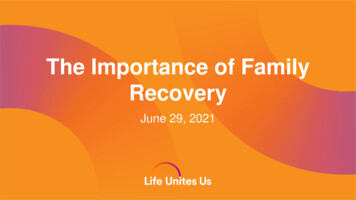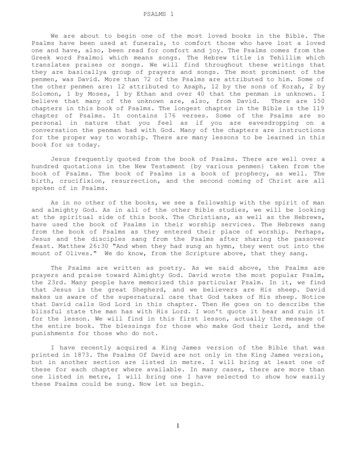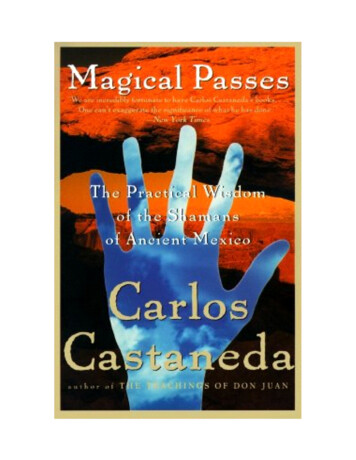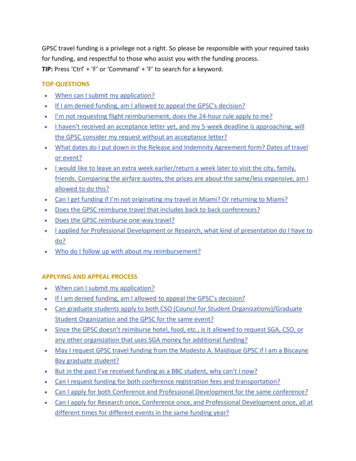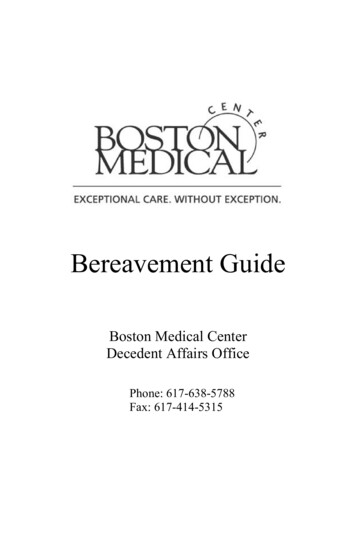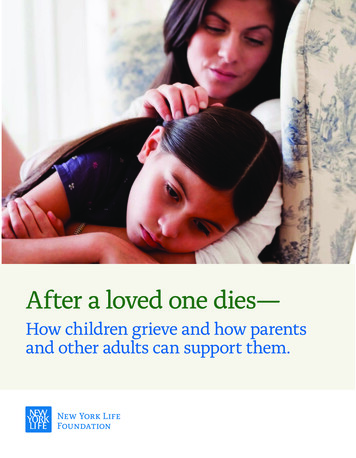
Transcription
After a loved onepasses awayYour guide to financial and practical matters
What’s insideWhat you can do right now 2Collect important papersRecordkeepingDuring the first month 4Choose an attorneyConsider the willApply for benefitsDuring the first few months 7Change title or ownershipLocate tax returns and financial statementsComplete notificationsIn months 3–6 10Consider hiring an accountantReview your finances and consider hiring a financial plannerBy month 9 12Complete estate settlementOn to the future 12Some final thoughtsGlossary 13Suggested checklist 14
IntroductionLosing a family member or friend is one of life’s hardest blows. Yeteven during the emotional turmoil that follows someone’s death,there are important—perhaps time-sensitive—decisions to make.Often the person who must make the decisions is the spouse or partner of the personwho has died. Or, the survivor may be a child, brother or sister, parent, or close friend.Although each person may have different tasks to handle, everyone must do some basicthings. In the best situations, some preparation for these tasks will have already beenmade. A valuable lesson for all of us, at any age: Taking the time to organize papersmakes a difficult time immeasurably easier for those left behind.What are some of the important things you need to do in the first few months after aloved one has passed away? Let’s start with what’s required immediately. Then we’llmove to some issues you may have to address as time goes on.After a loved one passes away1
What you can do right nowCollect important papersYou may have to search for some of them. Check file cabinets, desks, offices and evenodd places—kitchen drawers, closet shelves and cartons tucked away in the garage.While it might be tempting to throw things out in hopes of making the search lessoverwhelming—don’t. You can’t be sure which papers might prove to be important lateron. It may be helpful to ask someone you trust to help you go through the decedent’spapers, if only for support during this painful task.While it might betempting to throwthings out inhopes of makingthe search lessoverwhelming—don’t. You can’tbe sure whichpapers mightprove tobe importantlater on.For access to other documents, you may need court permission. In some states, forexample, safe deposit boxes are sealed when someone dies. If this happens, you will needa court order to have access to the contents.Here are some of the documents you will need:Copies of the death certificateGenerally, you need to provide a copy of the death certificate every time you eithermake a claim for benefits or retitle assets from the decedent’s name. You can getcertified copies of the death certificate through your funeral director or from the countyhealth department. Most likely, there will be a charge for each certified copy. You maywant to get 10 to 12 copies initially, but you may need more later. Keep in mind thatit isn’t always easy to get additional copies. So, depending on your situation, you maywant to get more certificates early if you think you may need them.Copies of all insurance policiesIf you can’t find them, call the decedent’s life insurance agent or contact the insurancecompany directly.Copies of your marriage licenseIf you’re the spouse of the decedent, you need a copy of your marriage certificate toapply for certain benefits. If you can’t find it, you can usually get copies from the countyclerk where your marriage license was issued.Copies of children’s birth certificatesIf the decedent had any dependent children, you’ll need their birth certificates to establishclaims for certain Social Security benefits. If you can’t locate them, copies are availablefrom the public health office of the state or county where the child was born.2After a loved one passes away
The revocable trust and willThe decedent’s durable powers of attorney have no further legal force or effect.Instead, the decedent’s trust or will identifies the person responsible for finalizing thedecedent’s affairs and pay the decedent’s debts, taxes and administrative expenses.The trust or will also provides direction for distributing the decedent’s remaining assets.You’ll need to locate the original trust and will. It may be in the decedent’s safe depositbox or filed in the decedent’s home with other important papers. It is also possible thatthe decedent’s attorney has the original trust and will for safekeeping.A copy of veterans’ discharge papersYou will need a copy of a certificate of honorable discharge to claim any veterans’benefits. The certificate should show the branch of service, dates of service and rank.If you can’t find a copy of the discharge, you may request one by completing StandardForm 180 (SF180). You can download this form online at ndard-form-180.html. You may also fax 314-801-9195or write to request Standard Form 180. Send your written request to: the NationalPersonnel Records Center (Military), One Archives Drive, St. Louis, MO 63138-1002.Social Security informationBe sure to have your Social Security number along with the Social Security numbers ofthe decedent, his or her spouse (if not you) and any dependent children. If you do notknow the Social Security numbers for the individuals that are needed, you could look forthe numbers on past tax returns, in employment records or with other personal papers.RecordkeepingKeep all documents organized, perhaps by filing each in separate folders. If you’reconcerned that any documents will get lost, make copies. You should also keep allincoming mail so bills and checks won’t get lost. And, depending on your situation, youmay want to have the decedent’s mail forwarded to you (or someone else).Don’t throw anything away until you have a chance to go through it. Be alert forunordered merchandise or bills for services never performed. Some scam artists takeadvantage of the recently bereaved in the hope that they will pay phony bills withoutinvestigating. It’s a good idea to ask for itemized bills from doctors and attorneys.Avoid paying bills “for services rendered” only.Remember, this is an emotional time when your concentration and memory may not beat their best. Keep records of all outgoing mail, particularly if it’s business related.After a loved one passes away3
During the first monthChoose an attorneyUnless required by the decedent’s state of residence, not all estates need an attorney. Still,a good attorney can help handle many problems more easily than you may be able to alone.An attorney can answer such questions as:TIAA financialconsultantshandle situationslike yours everyday. Theirsuggestions maymake it easier foryou to make yourown informeddecisions.WWMy spouse’s safe deposit box is in his name only. How do I get access to it?WWDoes the decedent owe any estate or inheritance tax?WWWhat rights do creditors have to the estate of the decedent?You may know an experienced estate planning attorney. If not, try to get a referral froma reliable source. For example, you can contact the local probate court for a listing ofattorneys who handle probate matters.It pays to think carefully before you hire an attorney. Be sure to discuss the fees that willbe charged. Generally, the more complicated the estate, the higher the attorney’s fees.If you can’t afford the cost, but feel you need an attorney’s help, check your local barassociations to find out if free legal services are available where you live.Note: Although not required, you might consider using the attorney who drafted the will.It may be helpful since he or she may be familiar with the decedent.Consider the willIf there is a will, you, or your attorney, will need to file a petition with a local probatecourt to admit the will to probate. Probate is the legal process of proving the validity ofa will before an estate can be distributed to the rightful heirs. And it involves the courtappointing an executor or personal representative of the estate. The executor—who isalmost always named in the will—oversees the distribution of the decedent’s assets,pays any debts or taxes, and complies with any legal and accounting requirements.Not all assets have to pass through probate. For example, any property titled inthe names of both the decedent and another person as joint tenants with right ofsurvivorship automatically passes to the co-owner. Proceeds from life insurancepolicies, retirement annuities, Individual Retirement Accounts (IRAs), etc., are paiddirectly to beneficiaries (if one is designated). In addition, any property titled in thename of the decedent’s revocable trust at death can also avoid probate and will bedistributed to the beneficiaries named under that trust.If the decedent does not have a will, he or she is said to have died intestate and theestate will pass per state laws of intestacy. You, or your attorney, will need to file apetition to request appointment as the decedent’s administrator. The probate court,which is located in the county where the decedent last resided (or where any out-of-state4After a loved one passes away
real estate or other tangible property that requires probate is located), typically hasjurisdiction over the estate. The administrator’s duties and responsibilities are similarto those of a personal representative or executor. If more than one person is interestedin serving as the administrator, each would file a petition with the court requesting theappointment. The court would then determine which person is best suited to serve.After all of the administrative tasks are complete, most states direct the administratorto distribute the decedent’s remaining assets to the surviving spouse and any children.If there is no surviving spouse or children, assets will generally be distributed to thedecedent’s closest blood relatives, perhaps parents, brothers and sisters, half-brothersand half-sisters, grandparents, nieces and nephews, or cousins.Each person’s interest in the estate depends on the survival scenario. If no relativesare living, then a decedent’s assets could be added to the state’s escheat fund. Anattorney’s help may be invaluable.Apply for benefitsYou may be eligible to claim certain survivor benefits such as pension benefits,veterans’ benefits, Social Security or other employee benefits.Pension benefitsIf the decedent worked for any length of time, death benefits may be available undera company pension or annuity plan. If the employer was a state college or university,benefits may be payable through the state retirement system. Pension benefits earnedthrough the federal government often carry survivor pension benefits, too. Check with anycurrent and previous employers to determine whether there are any retirement benefitsthat are available.Veterans’ benefitsThere are several different types of veterans’ benefits. If a veteran was receivingveterans’ benefits at the time of death or met certain other conditions, he or she mayqualify for a contribution toward burial costs in a private cemetery. Grave markers areavailable free of charge to eligible deceased veterans. Other benefits may includeeducational assistance and medical care for dependents.You can find information on veterans’ benefits, including a listing of national cemeteriesby state, on the Department of Veterans Affairs (VA) website, va.gov, or by calling800-827-1000. To apply for benefits, contact your local VA office (you can’t applyonline). The VA will send you instructions and forms. You’ll need:WWA certified copy of the death certificateWWA copy of a certificate of honorable dischargeWWYour marriage certificate (if the decedent was your spouse)WWThe birth certificates of any dependent childrenWWAll relevant Social Security numbersAfter a loved one passes away5
Social SecurityIf the decedent contributed to Social Security for the required period of time, you maybe eligible for survivor benefits, usually as a spouse or dependent child.Payment of Social Security survivor benefits is not automatic. You must file a claim.Call Social Security at 800-772-1213 to find out if the decedent was covered and todiscuss possible benefits. One of the online calculators found on the Social SecurityAdministration website, ssa.gov, may also provide helpful information. (Type “calculator”in the Search box.)When applying for Social Security survivor benefits, make sure you have these items:WWDeath certificateWWProof of age, such as birth certificates, for you and any other beneficiary(ies)WWProof of your and the beneficiaries’ relationships to the decedent (for a spouse, themarriage certificate; for children, birth certificates or adoption papers)WWSocial Security numbers of all concernedWWW-2 forms of the decedent for the past two years to help Social Security computeyour benefitsIMPORTANT NOTE: If the decedent was already collecting benefits, it’s important tonotify the Social Security Administration that he or she has died. Also, if Social Securitybenefits were being directly deposited to an account, be sure to keep the account openuntil the decedent’s last payment is received.Other employee benefitsIf the decedent was employed at the time of death, you should contact the employerabout any health or accident insurance in addition to life insurance. In some cases,an employee’s health insurance can be continued for a surviving spouse or dependentchildren. Also, ask the employer about any payment due for unused vacation or sick leave.Even if the decedent wasn’t employed, you may still want to contact previous employersto check if you’re entitled to any benefits. Ask if the decedent belonged to any unions orprofessional organizations that may offer death benefits for their members.6After a loved one passes away
During the first few monthsChange title or ownershipAfter a death, you may need to transfer ownership or change the title on property, ormodify documents.Your houseIf you owned a house with the decedent and there is a mortgage outstanding, you’renow responsible for that debt. It may well be your largest single personal obligation. Ifthere is mortgage insurance on the loan (a type of credit life insurance), the outstandingmortgage balance on your house or part of the outstanding balance may be payable bythe insurance. Advise your creditors of the death, and they should be able to tell you ifcredit life insurance is in force.Insurance policiesIf the decedent had life insurance, the death benefit will pass to the named beneficiary.If there is no named beneficiary, the death benefit will generally pass according to theterms of the decedent’s will. Keep in mind, in addition to life insurance policies that thedecedent may have owned, there may be group term life insurance through his or heremployer or credit life insurance, most often seen as mortgage insurance.Check your own insurance policies to see if your beneficiary designations should beupdated. Evaluate your coverage to determine if you may need less or more, dependingin part on whether you have dependents. Consider whether you need to purchase yourown or additional health insurance.AutomobilesYou will need to change the title of any cars owned by the decedent. Your state’sdepartment of motor vehicles can tell you what needs to be done to change a title.You may also need to change the name on the policy of your automobile insurance.Your willIn your own will, you may have left property to the decedent. If so, be sure to update your will.Credit cardsCancel credit cards held exclusively in the name of the decedent. If there is anoutstanding balance:WWDetermine if the account is insured. Insurance through the credit card provider maypay off any balance upon notification of the death.WWDetermine if the account was shared. If a spouse, family member, or businesspartner co-signed the card application, that person is likely responsible to pay thebalance. However, if a second cardholder is an “authorized user” (i.e., only hascharging privileges), they are not responsible.After a loved one passes away7
WWDetermine if the account is owned solely by the decedent. If the decedent lived ina community property state (Alaska, Arizona, California, Idaho, Louisiana, Nevada,New Mexico, Texas, Washington or Wisconsin), his or her spouse may be responsibleto pay the balance, even if the account is individually owned. Generally, if the accountis owned solely by the decedent, the executor is likely responsible to pay the balance.The Credit Card Act of 2009 requires card providers to notify the executor in areasonable time, and refrain from adding fees and penalties while the estate is beingsettled. The Federal Trade Commission also provides debt collection guidelines,allowing legitimate collection activity while reining in overaggressive tactics.If you’re the spouse of the decedent, you may have credit cards in both your names.You should notify the credit card companies that your spouse has died and the cardshould list your name only. Continue making payments in the meantime to keep yourown good credit rating. When applying for new cards, be sure to tell the lender aboutcredit cards you shared with your spouse.Retirement plan assetsRetirement plan assets such as 401(k), 403(b), 457(b) and IRAs, pass to the namedbeneficiaries. The amounts that are received by the beneficiaries from non-Roth retirementplans will be subject to income tax, unless the income is a return of after-tax (previouslytaxed) contributions or nondeductible contributions, if from a Traditional IRA. When youinherit retirement assets there are strict rules regarding when you are required to takewithdrawals and how much you must take. And these rules will differ based on yourrelationship to the decedent. A surviving spouse will have more options than a non-spousewho inherits retirement plan assets. As a beneficiary, you can speak with a TIAA financialconsultant, at no additional cost to you, to discuss your withdrawal options. You’re alsoeligible to use other TIAA products and services. To arrange for an appointment with aconsultant, call us at 800-842-2252, weekdays, 8 a.m. to 10 p.m. (ET).If the decedent was already receiving TIAA retirement income, survivor benefits dependon the income option under which the decedent was being paid. In this case, it’simportant for you to speak with a TIAA consultant. To arrange for an appointment (at noadditional cost to you), call us at 800-842-2252, weekdays, 8 a.m. to 10 p.m. (ET). Oncewe learn of a participant’s death, we are able to prepare and send to each beneficiarya packet of information, including the forms to complete along with the estimates ofsurvivor benefits. Our consultants can help you to think about your withdrawal optionsand can explain the plan rules.Bank accountsIf you and the decedent had a joint bank account (savings, checking, CD, etc.) thatwas owned as joint tenants with rights of survivorship it will usually pass to youautomatically. Speak with a bank representative to see about changing the title andsignature card on the account. You may need to show a death certificate to do this.In some states, joint accounts are frozen upon notification of a death. Check with thebank to learn how to have your funds released. Bank accounts that were solely in thename of the decedent will have to go through probate.8After a loved one passes away
Note: If you plan to open a bank account for the estate, the estate will need itsown tax identification number. You can find information and forms to apply for a taxidentification number on the Internal Revenue Service website, irs.gov.Stocks, bonds and other investmentsIf you shared investments with the decedent and ownership passes directly to you,check with your stockbroker to change the title on stocks, bonds, mutual funds, etc.The broker may need a copy of the death certificate.If the decedent owned the investment account(s) in his or her name only, title will bechanged to the beneficiary. The financial institution will usually request copies of thedeath certificate and the will to confirm a beneficiary’s right to the portfolio assets.Safe deposit boxYou’ll generally need a court order to open any safe deposit box rented only in the nameof the decedent. Until the will has been probated, only the will, life insurance policies orother documents relating to the death can be removed from the safe deposit box.Locate tax returns and financial statementsAlong with other important documents mentioned earlier, you should locate federal andstate (if applicable) tax returns for the three years prior to the decedent’s death. Plus,keep at least three months’ worth of bank and brokerage account statements on file.Note: It’s very important that you keep bank and brokerage statements for the monththe decedent passed away and the prior month for future reference.Complete notificationsThe funeral home or memorial service firm will usually prepare an obituary and submit itto local newspapers. You might want to think about others who should know about thedeath. Consider notifications to alumni groups, professional organizations, societiesand any other groups to which the decedent belonged.After a loved one passes away9
In months 3–6Consider hiring an accountantThere are a number of different tax returns that may need to be filed. You may decideto prepare them yourself or you may choose to work with an accountant. In eithercase, you will want to make sure that you, your accountant and your attorney are allcoordinating efforts.Check your owninsurance policiesto see if youneed to updateyour beneficiarydesignations.For the year in which the death occurs, the decedent’s income taxes will be due on thenormal filing date of the next year. Of course, you can request an extension, which will begranted if your extension request is filed by the original due date of the return. If you’rethe husband or wife of the decedent, you can still file a joint return for the year of deathas long as you have not remarried.Upon a loved one’s death, it’s possible that you are required to prepare and file estateor inheritance tax returns at both the state and federal level.About 18 states have their own estate tax or inheritance tax. Keep in mind thatstate-level estate and inheritance tax and any applicable exemption amounts may bedifferent than the federal estate tax exemption amount. This means that the decedent’sestate could be exempt from federal taxes but may still owe taxes to the state.Federal estate tax returns are due within nine months of the date of death. For 2021,the applicable federal exclusion amount is set at 11.7 million per person (an increasefrom 11.6 million in 2020). The exclusion will revert back to the 2017 level ( 5 million,adjusted for inflation) beginning in 2026 unless Congress takes affirmative actionto keep it. Further, the concept of “portability” allows a married couple to effectivelycombine their estate tax exemption amounts; meaning, in 2021, a married couple canpass 23,400,000 free from gift or estate tax either during their lifetime or followingtheir deaths. Your attorney or accountant can guide you in preparing income or estatetax forms and give you valuable information on your state’s estate tax, inheritance taxor gift tax, and fiduciary income tax, if applicable.An attorney or accountant can also advise a beneficiary on whether it may be appropriateto consider disclaiming property you are set to inherit from the decedent to facilitatecertain planning objectives. Disclaiming is a technique in which you renounce yourinterest in an asset that may be passing to you. This allows the asset to pass to the nextin line beneficiary. There are stringent requirements with respect to effectively executingdisclaimers. It will be important for you to understand the impact that disclaiming assetsmight have on your long-term financial and estate planning goals.You can download forms and find more information on the Internal Revenue Servicewebsite, irs.gov.10 After a loved one passes away
Review your finances and consider hiring a qualified financial plannerIt is important to review your cash flow (i.e., to take a look at how much money is comingin each month and how much money is going out to meet expenses). From this, you canput together a short-term budget.If your monthly expenses are greater than your income, look for ways to cut spending orfor possibilities to boost your income. If your monthly income exceeds your expenses,you can consider additional savings or investments using the inherited assets—toprovide for your future.Retaining the services of a qualified financial advisor can be invaluable to you becauseyour financial situation and income needs will likely change over time. Financialplanners play a critical role in the quality of life enjoyed by millions of people byfunctioning as their personal financial advisor and helping them to plan for and takecontrol of their futures.The planner’s investment oversight and review can help with asset allocation(i.e., diversification) and can help to assess market risks. In addition, planners aretrained to recognize how changes in your health or family situation, new hobbies orgoals, market fluctuations, changes in tax laws, or changes in risk tolerance can allimpact your financial situation.For this reason, it can be beneficial to meet regularly (e.g., annually) with a planner todetermine if there are any material changes in your situation and to determine whetheryour financial plan is still on track. From time to time, you’ll likely want to adjust yourinvestment goals, change your risk tolerance, rebalance your assets or implement anew income strategy in response to changes to your situation.It is important to us that you know that you are eligible to work with a TIAA consultantat no additional cost to you. To arrange for an appointment, call us at 800-842-2252,weekdays, 8 a.m. to 10 p.m. (ET).After a loved one passes away 11
By month 9Complete estate settlementTypically, there are just a few outstanding details remaining by the ninth month followingthe decedent’s death. An important reminder is that the federal estate tax return,if required, is due nine months after the decedent’s death. Typically, assets will bedistributed to the beneficiaries upon closing the estate.On to the futureSome final thoughtsRight now, the future may seem very far away. When you’re grieving or feelingemotionally off balance, it’s natural to feel overwhelmed by practical matters that needattention. Try to take things one step at a time. Focus on what needs to be done rightaway, today; and then tomorrow; and then the day after. Before too long, the list ofthings to do will look more and more manageable.While we’ve tried to address most of what needs to be done after a loved one passesaway, many situations will be unique. For more detailed guidance on what to do after adeath, you may want to seek legal or other professional advice.12 After a loved one passes away
GlossaryExecutor/Personal representativeThe person appointed to administer the estate ofsomeone who has died leaving a will which nominatesthat person. The executor/personal representative mustensure that the person’s desires expressed in the will arecarried out. Practical responsibilities include gatheringthe assets of the estate, obtaining information in regardto all beneficiaries named in the will and any otherpotential heirs, collecting and arranging for payment ofdebts of the estate, ensuring estate taxes are calculated,forms filed and tax payments are made.TestatorThe person who creates a valid will.ProbateThe general term for the entire process of administrationof an estate of a decedent, including those without wills,with court supervision. The initial step in the process isproving a will is valid and then administering the estate ofthe decedent according to the terms of the will. The willmust be filed with the clerk of the appropriate court in thecounty where the decedent lived, along with a petition tohave the court approve the will and appoint the executornamed in the will. If the court determines the will is valid,the court then “admits” the will to probate.Probate courtA specialized court that has jurisdiction over probatingwills and administering estates.IntestateThe position of dying without a valid will in place.Closing letterFor estate tax returns filed on or after June 1, 2015,closing letters will be issued only at the request of thetaxpayer. Instead, account transcripts from the TranscriptDelivery System (TDS) are available online to taxprofessionals. Transcripts reflect transactions includingthe acceptance of Form 706 and/or the completion of anexamination. File this with your state tax authority, whichwill then issue its own estate tax closing letter, confirmingthe closure of the estate. If the estate went throughprobate, you will need the assent of the beneficiaries thatthe estate is distributed. Submit this to the probate courtto receive final approvals of the estate closure.After a loved one passes away 13
Suggested checklistNotapplicable1. Collect important papersDeath certificateInsurance policiesMarriage licenseBirth certificatesThe willVeteran’s discharge papersSocial Security numbersMost recent tax returns2. Forward decedent’s mail3. Contact an attorney4. File for probate of will5. Apply for benefitsLife insurance proceedsRetirement plan benefitsVeterans’ benefitsOther employee benefitsSocial Security benefits6. Change titles and ownershipHomeInsurance policiesAutomobilesYour will, revocable trustCredit cardsBank accountsStocks, bonds, other investmentsSafe deposit boxes7. Complete notifications of death8. Hire an accountant9. Review finances10. File and pay taxes14 After a loved one passes qqqqqqqqqqqqqqqqqqqq
NotesAfter a loved one passes away 15
Notes16 After a loved one passes away
How to contact usOnlineTIAA.orgTo learn more about T
a company pension or annuity plan. If the employer was a state college or university, benefits may be payable through the state retirement system. Pension benefits earned through the federal government often carry survivor pension benefits, too. Check with any current and previous employers to determine whether there are any retirement benefits
